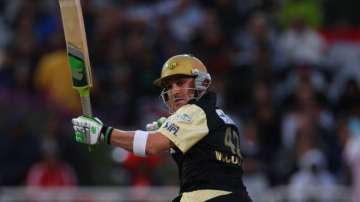12 Years Of IPL: How Brendon McCullum's freakish 158* changed the dynamics of T20 format forever
McCullum was roped in by KKR for US$700,000, making him the biggest winner from New Zealand and among the top buys in the first-ever auction. And he repaid every cent of it in top-class fashion, an innings that every avid follower of the game remembers.

There have been very few performances in the history of this glorious sport that has revolutionised the game, changed the perspective of an aspect and hence urged players to question their approach. On that cloudy April evening in Bengaluru, Brendon McCullum was among those, 21 other men on the field still looking to learn the new format that cricket fraternity has so dearly embraced over the next decade and more. And little did he know that in just about an hour and a half, his life would completely change and so would the sport. The New Zealander scored a thunderous and portentous 158* off just 73 deliveries for Kolkata Knight Riders in the very first game of the Indian Premier League back in 2008 and hence changed the sport irrevocably. 'Well-crafted' or 'sublime' weren't the words that one was looking for. It was a freakish knock by all nature that helped give IPL just the kind of rousing and picture-perfect start it required.
The format wasn't new to the fans. T20 cricket had been part of English domestic circuit for five years by then, moreover, the world had already witnessed the inaugural T20 World Cup, hosted by South Africa. And a lot of glory was reserved for India in the tournament. India had won the bizarre bowl-out tie-breaker in the opener against Pakistan. Yuvraj Singh had hit six sixes in an over against Stuart Broad. And to top it all, India were the champions of the maiden edition, beating their arch-rivals, with the country rejoicing to their first 'World Cup' win since the historic 1983 edition. A year later, the then masters of the format, looked to seize ownership of T20 cricket with the introduction of the IPL - a franchise-style cricket league where auctions were held and players went to the highest bidders.
McCullum was roped in by KKR for US$700,000, making him the biggest winner from New Zealand and among the top buys in the first-ever auction. And he repaid every cent of it in top-class fashion, an innings that every avid follower of the game remembers. It was the league's first century, T20s first 150-plus score and McCullum laced the monstrous innings with 10 boundaries and 13 sixes at an astounding strike rate of 216.43.
But McCullum had to endure a difficult start before he could get off the mark. In fact, he went without scoring in his first five balls before smashing Zaheer Khan for consecutive boundaries in the next over. And in the next ball, he was deceived and miscued an attempted flick only to see the ball sailing over the third man for a six. Thus began his onslaught. By the fifth over, he was at 40 off 19 and shortly after KKR's second wicket, in the 12th over, McCullum had reached the triple-figure mark.
What made his innings even more impactful was that the other batters including the entire RCB side managed 110 runs off 138 balls at a strike rate of 79.71. McCullum scored 71 % of the team runs
"One of the big things about T20 is not having the fear of getting out," McCullum told Knight during that session. "You've got to be brave enough to make decisions and make plays that carry levels of risk with them."
Chinnaswamy had gone berserk watching McCullum's spectacular knock and cricket fraternity went into a frenzy. But for McCullum, it wasn't something he had done before. A month before his unbeaten 158, he had scored 170 off 108 balls in the final of New Zealand's State Shield. The only difference was that not many were even aware of the match. When McCullum made his way back to the pavilion after KKR's 222/3, he received a standing ovation. IPL had provided McCullum the perfect platform and in return, he gave the league a memory of a lifetime. Over the next 12 years, IPL witnessed over 50 centuries with McCullum's 158* being bettered as well - by Chris Gayle (175 not off 66 balls in 2013). Yet it is that blockbuster innings on that April evening that has been embedded deeply into the hearts of every IPL and cricket followers.
A change in the gentlemen's sport was among the visions that Lalit Modi wanted when he introduced the concept of IPL. And three hours into that evening, the change had already begun.
IPL gave rise to franchise-league cricket with many by-products emerging. It also brought about a new group of cricketers who solely depended on T20 cricket to survive hence bringing out the concept of a white-ball and a red-ball cricketer and a subsequent emergence of T20 specialist players. It also strengthened the bond between international cricketers and also provided domestic cricketers to prove their worth and break into the national side while being nurtured by the veteran international stars.
The format also changed the approach of batters and bowlers. Virender Sehwag's famous "see the ball, hit the ball" became more relevant among batsmen which even gave rise to unorthodox cricketing shorts. For bowlers, variations were more important than just bowling the conventional good-length deliveries which was in this format only meant to blast out of the ground. Not to forget, even fielding had word 'stunning' and 'astounding' attached to it, hence urging players to be athletic.
One knock, one league and a whole new avenue of possibilities opened up and world cricket has never been the same.